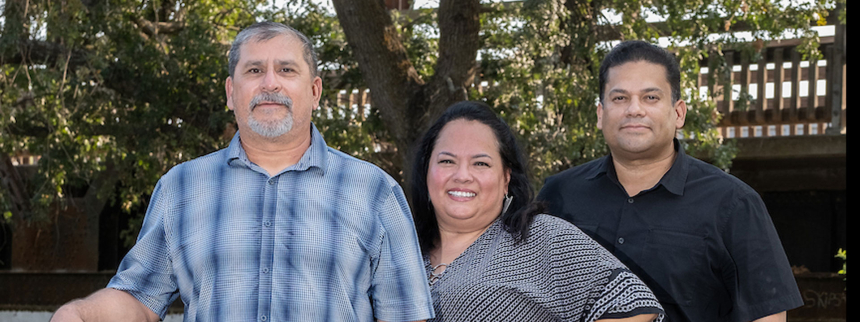
Involved in faith-based community organizing in northern and southern California for more than 20 years, Herman Barahona has a deep concern for advocating for the poor, looking at the root causes of environmental racism affecting the poor, and working for environmental justice. He’s convinced each person can play a part in affecting change, no matter how small.
“All of the chronic health conditions my family has suffered over the years living in historically marginalized neighborhoods, I am convinced there is some link to environmental issues,” Herman says. When he read Pope Francis’ encyclical, Laudato Si’, in 2015, “the Holy Father’s words just jumped out at me.”
At the time, he was working for Placer County in health and human services. “I quit my job and decided to make this a mission,” he notes. “It’s been an interesting journey; I’ve had enough time working in civic groups – whether it’s in government or some sort of private nonprofit entity – to know that we need God in this conversation about environmental challenges and their impact on the poor.”
In June, Herman joined the diocese’s Office of Catholic Charities and Social Concerns through an internship funded by the U.S. bishops’ Catholic Campaign for Human Development. He’s coordinating a multi-year reflection and action plan in the diocese in response to Pope Francis’ 2015 encyclical (see related story, page 20). He is also founder and lead community organizer of the Sacramento Environmental Justice Coalition, a group of nonprofits, neighborhood groups and church leaders.
Herman, a native of Honduras who grew up in south central Los Angeles, grew up Catholic. After being away from the church for some years, he returned to practicing his faith in 2019. He’s a member of St. Philomene Parish in Sacramento.
Laudato Si’ “calls for an integral ecology, an integral community in harmony with creation, so that means we integrate our understanding of all environmental and resource issues, from air quality to drought to wildfires, and our interdependent experience,” Herman notes. “Folks who live in rural communities as well as farmers in those communities are providing sustenance for our urban centers – we can’t live without each other. So an understanding of our entire region, that’s our calling, because we impact one another.
“The water that comes from the Sierras or the rain that feeds our urban centers, protects our waterways, refills our aquifers, and it also saves lives,” he adds. “So Laudato Si’ charges us to come up with new ways – a new culture that sustains and creates life – and that’s the challenge. We are so used to living in an excessive consumer culture, and this needs to be considered as we try to repair the world today.”
The diocese’s Laudato Si’ plan has three phases: reflect, act and evaluate. “The reflection process we will engage in will help us look at what is the history and the current realities families are facing, and what we can do about it based on our faith values,” Herman notes. “We need to closely examine what we need to do in the 21st century to make this place habitable for our grandchildren and generations to come.”
He encourages everyone to read and reflect on Laudato Si’. “The commitment to protect creation is expressed in the beautiful language in which the encyclical is written,” he says. “It’s a calling that people are going to respond to. All I ask is for people to read it. There’s definitely a powerful message there about the bond that we need to reweave again with creation, with God, and with each other.”
LEARN MORE
About the Diocese's Care for Our Common Home Action Plan by contacting Herman Barahona at hbarahona@scd.org or 916-733-0253 or visit /environment.
In photo above, Herman Barahona, right, joins with Care for Creation leaders Lucy Silva-Thomas, center, and Vincent Valdez.

